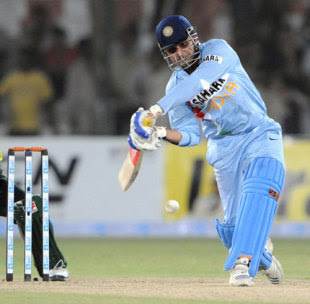 Chaminda Vaas and Sanath Jayasuriya will both return to the Sri Lankan team after being rested for the match against UAE.
Chaminda Vaas and Sanath Jayasuriya will both return to the Sri Lankan team after being rested for the match against UAE.
Match facts
Sunday, June 29, 2008Start time 16.00 (local), 10.00 (GMT)
Big Picture
On current form, Sri Lanka are the clear favourites in this Super Four match: their win against Bangladesh in the group game has already given them a two-point cushion, while Pakistan have to recover from a disappointing loss to India, which was made worse by the rib cartilage injury to Umar Gul, ruling him out of the tournament. There are also clear indications of a rift between the Pakistan selectors and the captain, with Shoaib Malik appearing to blame the selection committee after the loss to India. Sri Lanka, on the other hand, have coasted through their two matches in the tournament, against admittedly easier opponents, and their team has a fairly settled look to it.
Unlike most other teams, though, Pakistan thrive in situations when there's little going in their favour. They have enough firepower in their batting line-up to take the early initiative or chase down a stiff target - Malik's form at the top of the order has been especially pleasing - but the bowling is a concern on these flat pitches.
Sri Lanka haven't been stretched so far in the tournament, but that could change on Sunday. Also, they haven't enjoyed the match-up against Pakistan of late, losing five of their last six completed ODIs against them, including a 2-1 series defeat in Abu Dhabi last year. In that tournament, however, they didn't have the services of Chaminda Vaas and Muttiah Muralitharan, two players who have been vital cogs in the Sri Lankan bowling machine for years.
Form guide
(Last 5 completed ODIs; most recent first)
Pakistan LWWLW
Sri Lanka WWLLW
Watch out for ...
Mohammad Yousuf has scored two brisk cameos in the Asia Cup so far - his tournament strike rate is 120.83 - indicating he is in fine touch, but he hasn't converted them into something more substantial. His excellence against spin could make him a huge factor on Sunday.
Ajantha Mendis was more than a handful for the hapless UAE batsmen, and on a pitch aiding spin, he can be a threat for more accomplished batsmen as well.
Team news
Umar Gul's absence is a huge blow to Pakistan's bowling, and Wahab Riaz, the left-arm fast bowler, will play in his place. Riaz made his debut against Zimbabwe earlier this year and has taken nine wickets in four ODIs. The other likely change is the inclusion of Saeed Ajmal, the offspinner, for his first international match. Fawad Alam will probably miss out, which is slightly unfortunate considering the fact that he scored an unbeaten 63 and bailed Pakistan out against Hong Kong.
Pakistan (probable) 1 Salman Butt, 2 Shoaib Malik (capt), 3 Younis Khan, 4 Mohammad Yousuf, 5 Misbah-ul-Haq, 6 Shahid Afridi, 7 Sohail Tanvir, 8 Sarfraz Ahmed (wk), 9 Saeed Ajmal, 10 Wahab Riaz, 11 Iftikhar Anjum.
Sri Lanka had rested Sanath Jayasuriya, Chaminda Vaas and Muttiah Muralitharan against UAE, but expect all of them to return on Sunday.
Sri Lanka (probable) 1 Sanath Jayasuriya, 2 Kumar Sangakkara (wk), 3 Mahela Jayawardene (capt), 4 Chamara Kapugedera, 5 Chamara Silva, 6 Tillakaratne Dilshan, 7 Chaminda Vaas, 8 Nuwan Kulasekara, 9 Ajantha Mendis, 10 Muttiah Muralitharan, 11 Dilhara Fernando.
Stats and trivia
# Since 2006, Pakistan have a win-loss ratio of 5 in ODIs against Sri Lanka. Against no other team is their win-loss ratio better than 1.5.
# Pakistan also have an excellent record against Sri Lanka in Karachi, winning four out of five matches. In Asia Cup clashes, however, Sri Lanka have won six out of nine.
# Sri Lanka's top three batsmen don't have great stats versus Pakistan: Kumar Sangakkara averages 30.15, Jayasuriya 33.65 and Jayawardene 28.62 against them.
Quotes
"It is an important game for us because we have not carried any points from the qualifying rounds into the super stage. India and Sri Lanka have a slight advantage there."
Geoff Lawson, the Pakistan coach, admits his team is on the back foot
"I don't think Gul's absence would make much of a difference to them because they are a strong side and no matter what the conditions are, it basically depends on what sort of attitude they have towards a match on a given day."
Mahela Jayawardene is ready for a tough fight.


























